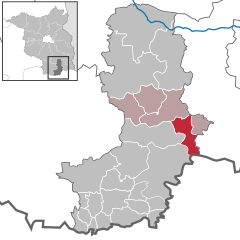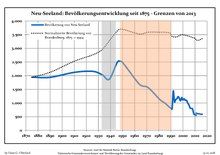Neu-Seeland
Appearance
Neu-Seeland | |
|---|---|
Location of Neu-Seeland within Oberspreewald-Lausitz district  | |
| Coordinates: 51°37′00″N 14°05′59″E / 51.61667°N 14.09972°E | |
| Country | Germany |
| State | Brandenburg |
| District | Oberspreewald-Lausitz |
| Municipal assoc. | Altdöbern |
| Government | |
| • Mayor (2024–29) | Marcus Lein[1] (Ind.) |
| Area | |
• Total | 56.18 km2 (21.69 sq mi) |
| Elevation | 117 m (384 ft) |
| Population (2022-12-31)[2] | |
• Total | 586 |
| • Density | 10/km2 (27/sq mi) |
| Time zone | UTC+01:00 (CET) |
| • Summer (DST) | UTC+02:00 (CEST) |
| Postal codes | 01983 03103 |
| Dialling codes | 035751 |
| Vehicle registration | OSL |
Neu-Seeland (Upper Sorbian: Nowa Jazorina) is a municipality in the Oberspreewald-Lausitz district, in Lower Lusatia, Brandenburg, Germany.
History
[edit]From 1815 to 1947, the constituent localities of Neu-Seeland (Bahnsdorf, Lindchen, Lubochow and Ressen) were part of the Prussian Province of Brandenburg. From 1952 to 1990, they were part of the Bezirk Cottbus of East Germany. On 1 February 2002, the municipality of Neu-Seeland was formed by merging the municipalities of Bahnsdorf, Lindchen, Lubochow and Ressen.[3]
Demography
[edit]
|
|
References
[edit]- ^ Landkreis Oberspreewald-Lausitz Wahl der Bürgermeisterin / des Bürgermeisters. Retrieved 3 July 2024.
- ^ "Bevölkerungsentwicklung und Bevölkerungsstandim Land Brandenburg Dezember 2022" (PDF). Amt für Statistik Berlin-Brandenburg (in German). June 2023.
- ^ Historisches Gemeindeverzeichnis des Landes Brandenburg 1875 bis 2005. Landkreis Oberspreewald-Lausitz. S. 36
- ^ Detailed data sources are to be found in the Wikimedia Commons.Population Projection Brandenburg at Wikimedia Commons



